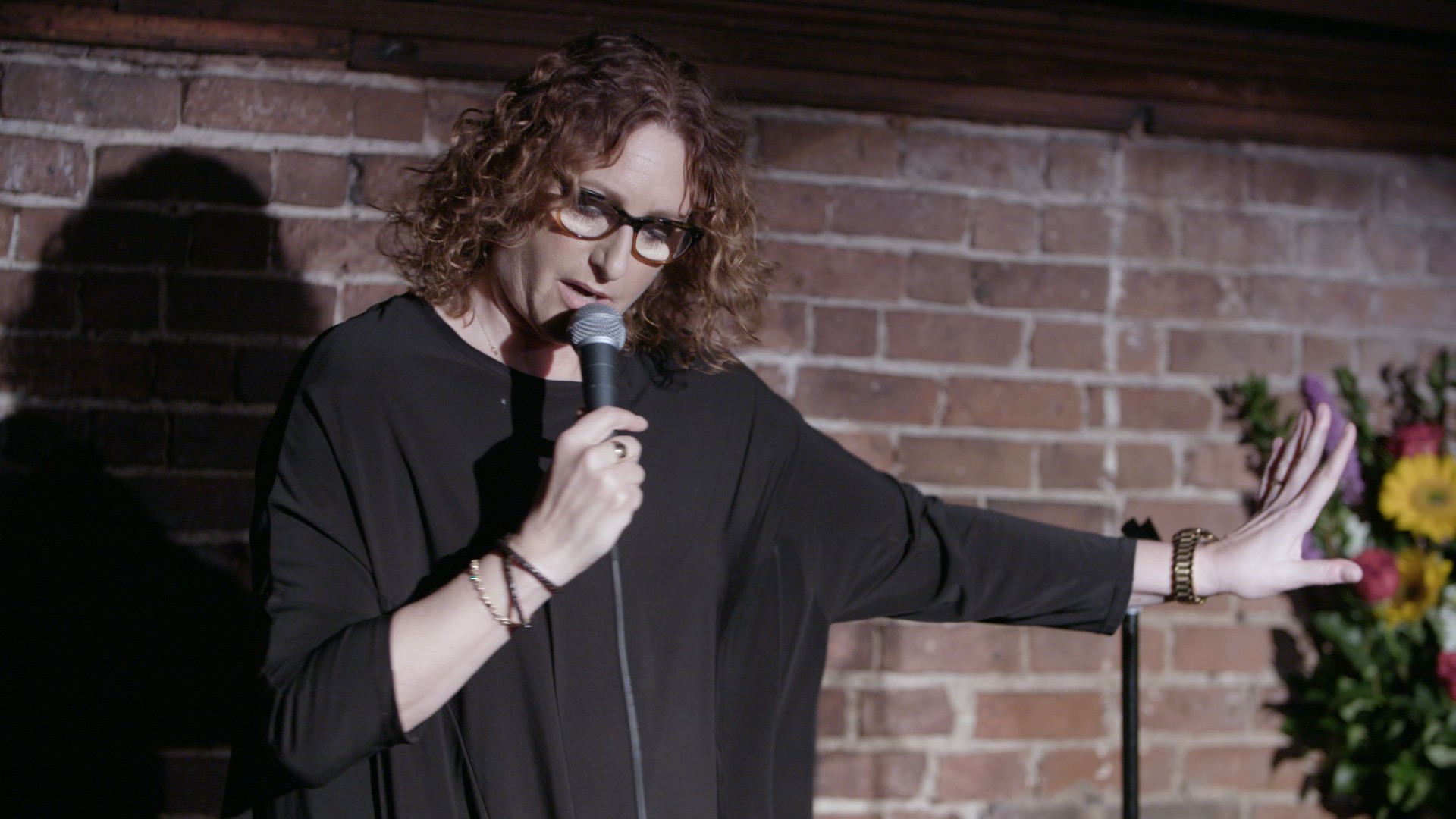Yumi Nagashima photo courtesy Facebook
“Is your man good at going down on you?”Of all the videos on comedian Yumi Nagashima’s YouTube channel, a clip of a recent set where she asked a front row couple about their sex lives seems to have grabbed the internet’s attention. It’s only been posted for a couple weeks, but it’s been viewed hundreds of thousands of times, and it captures her wide-eyed, gleeful expression as she defies whatever stereotypes her audience might project onto a Japanese woman doing stand-up in Canada.She moves onto the boyfriend, grilling him on his tongue technique. On the surface it can seem like a cheap laugh, but it’s a risky detour from mining one’s own sex life on the microphone—something often expected of women in comedy. This seems to be a signature of Nagashima’s stand-up: giving people a taste of what they want or expect, then turning tables without warning.“I feel like one of the really attractive things about stand-up comedy is you can grab the microphone on stage and you can say whatever you want to say,” she told VICE ahead of the release of her debut album My Name Is Yumi, which drops February 8. “Like in Japanese culture, especially for a female, they consider it not graceful to talk about sex in public, and I feel like subconsciously I’m trying to challenge that.”VICE caught up with Nagashima to talk about writing jokes in a second language, the #MeToo movement, and the sometimes-baffling Marie Kondo discourse.VICE: You joke about a lot of things, but the ones that get noticed seem to be about sex. Is that something you’re thinking about?
Yumi Nagashima: Yes, I write jokes about everything, and then like maybe the sex ones tend to stick out in audiences’ minds more because it’s shocking to them. To me it feels like why not sex? To me sex is funny.It’s another level to ask the audience about those things, too.
When I ask the audience, I choose the ones who are really laughing hard and smiling to me—I get the vibe they want to be friends with me. I think they understand when I ask questions it’s to be funny, not to attack them or anything.It also seems to play with expectations?
It’s true, like in Japanese culture, especially for a female, they consider it’s not graceful to talk about sex in public, and I feel like subconsciously I’m trying to challenge that. I just want to be free and able to say anything frankly, and I think, it was frustrating for me that Japanese culture brainwashed us into thinking that there are certain things a lady shouldn’t say. Having two languages in your brain, are you ever doing some translating to make jokes work?
Having two languages in your brain, are you ever doing some translating to make jokes work?
No, it’s funny, when I write joke, I start thinking in English. Sometimes people ask ‘have you ever thought of doing a set in Japanese?’ I feel like it wouldn’t work at all—we have a very different sense of humour and I don’t think it translates. English humour is dry and has a sarcastic side. In Japanese it’s really physical and somewhat more juvenile.So you’ve never tried?
I think like once I tried spontaneously because I found two Japanese girls in an audience. I did a little bit, like three minutes, and they loved it.What do you make of Vancouver’s comedy scene?
Vancouver audiences are very nice and polite. Compared to England or the US people are more reserved and somewhat more politically correct. They say if you really want to be a good comedian, get trained up in Canada and Vancouver. It’s considered tough—a difficult audience to make them laugh, because they’re so self-conscious.Do you feel like people project their insecurities on you?
You know, as an Asian artist, you just create things and you show up and then do your thing, do your best, and then I have no control of what audience thinks of me at all. That’s their stuff, not mine. I’m really careful not to take it too personally.You recently posted on social media about Marie Kondo. Do you have feelings about the way she’s fetishized and fixated on?
I just saw her show on Netflix. I started watching her maybe a week ago, and I really started cleaning up my place. She really inspired me! I wasn’t aware of how people were talking about her on Twitter. What were they saying?Someone suggested her speaking Japanese was a sign of America in decline on Monday, and there’s been plenty of other white people characterizing her as some kind of magical pixie sprite.
Oh wow, I feel more like, I’m from Japan and really familiar with Japanese culture, I just thought it was wonderful. Like she’s trying to teach more on the spiritual side of cleaning, and then I was thinking maybe I should teach that to my boyfriend.Does the #MeToo movement inform your work at all? How do you see it changing comedy?
I think it’s a really, really good movement, I’m so happy it happened. When I just started in comedy, there was roast battle for my boyfriend’s birthday. My boyfriend is a stand-up comedian too, and in order to make fun of him, a lot of the jokes went in the direction of, OK his name is Byron, so ‘Byron is so busy writing new jokes for Yumi,’ and then ‘Oh I want him to write my jokes too, but I hear you have to be Japanese and you have to suck his dick.’ I think after the movement, there’s more awareness of like how to respect female comedians. Sometimes you hear jokes like ‘because of this movement I have to be careful who I can hug,’ and it’s like, that’s exactly the point, you have to be a little bit more aware when you do an action, is this creepy or not creepy.So no more comments about your boyfriend writing jokes?
No, now they make fun that I’m writing jokes for him.Interview has been edited for style and clarity.Follow Sarah on Twitter.
Advertisement
Yumi Nagashima: Yes, I write jokes about everything, and then like maybe the sex ones tend to stick out in audiences’ minds more because it’s shocking to them. To me it feels like why not sex? To me sex is funny.It’s another level to ask the audience about those things, too.
When I ask the audience, I choose the ones who are really laughing hard and smiling to me—I get the vibe they want to be friends with me. I think they understand when I ask questions it’s to be funny, not to attack them or anything.
Advertisement
It’s true, like in Japanese culture, especially for a female, they consider it’s not graceful to talk about sex in public, and I feel like subconsciously I’m trying to challenge that. I just want to be free and able to say anything frankly, and I think, it was frustrating for me that Japanese culture brainwashed us into thinking that there are certain things a lady shouldn’t say.

No, it’s funny, when I write joke, I start thinking in English. Sometimes people ask ‘have you ever thought of doing a set in Japanese?’ I feel like it wouldn’t work at all—we have a very different sense of humour and I don’t think it translates. English humour is dry and has a sarcastic side. In Japanese it’s really physical and somewhat more juvenile.So you’ve never tried?
I think like once I tried spontaneously because I found two Japanese girls in an audience. I did a little bit, like three minutes, and they loved it.What do you make of Vancouver’s comedy scene?
Vancouver audiences are very nice and polite. Compared to England or the US people are more reserved and somewhat more politically correct. They say if you really want to be a good comedian, get trained up in Canada and Vancouver. It’s considered tough—a difficult audience to make them laugh, because they’re so self-conscious.
Advertisement
You know, as an Asian artist, you just create things and you show up and then do your thing, do your best, and then I have no control of what audience thinks of me at all. That’s their stuff, not mine. I’m really careful not to take it too personally.You recently posted on social media about Marie Kondo. Do you have feelings about the way she’s fetishized and fixated on?
I just saw her show on Netflix. I started watching her maybe a week ago, and I really started cleaning up my place. She really inspired me! I wasn’t aware of how people were talking about her on Twitter. What were they saying?Someone suggested her speaking Japanese was a sign of America in decline on Monday, and there’s been plenty of other white people characterizing her as some kind of magical pixie sprite.
Oh wow, I feel more like, I’m from Japan and really familiar with Japanese culture, I just thought it was wonderful. Like she’s trying to teach more on the spiritual side of cleaning, and then I was thinking maybe I should teach that to my boyfriend.Does the #MeToo movement inform your work at all? How do you see it changing comedy?
I think it’s a really, really good movement, I’m so happy it happened. When I just started in comedy, there was roast battle for my boyfriend’s birthday. My boyfriend is a stand-up comedian too, and in order to make fun of him, a lot of the jokes went in the direction of, OK his name is Byron, so ‘Byron is so busy writing new jokes for Yumi,’ and then ‘Oh I want him to write my jokes too, but I hear you have to be Japanese and you have to suck his dick.’ I think after the movement, there’s more awareness of like how to respect female comedians. Sometimes you hear jokes like ‘because of this movement I have to be careful who I can hug,’ and it’s like, that’s exactly the point, you have to be a little bit more aware when you do an action, is this creepy or not creepy.So no more comments about your boyfriend writing jokes?
No, now they make fun that I’m writing jokes for him.Interview has been edited for style and clarity.Follow Sarah on Twitter.
